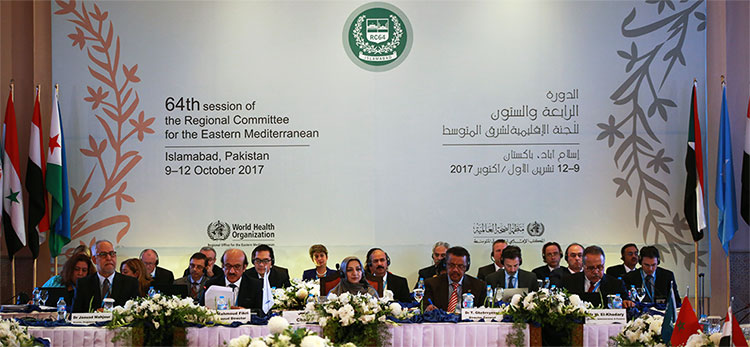
10 October 2017, Islamabad, Pakistan – For the first time in Regional Committee history, the opening of the 64th Session of Regional Committee for the Eastern Mediterranean was attended by the president of the host country, Pakistan, reflecting the importance of health on the national and global agenda.
In his opening speech, H.E. Mr. Mamnoon Hussain, President of Pakistan called on “the international community, and especially the regional countries, to cooperate willingly to address the challenges faced, putting aside political matters, so that a comprehensive strategy can be devised to control the spread of infectious diseases and other public health threats.”
Dr Mahmoud Fikri, WHO Regional Director for the Eastern Mediterranean, emphasized the necessity of placing health at the center of development, focusing on the right to health, equity, fairness, universality and solidarity. "We must see health as the smartest thing to invest in, which yields high returns. We must secure political commitment to achieve the Sustainable Development Goals, and truly we must leave no one behind", Dr Fikri added. “I would like to seize this opportunity to commend the tireless effort of both governments of Pakistan and Afghanistan, who are striving to make us part of a polio-free world.”
In his address, Dr Tedros Adhanom Ghebreyesus, WHO Director-General, said that this was not an easy time for many countries of the Eastern Mediterranean Region with unprecedented levels of conflict and senseless violence in many countries. "The world expects WHO to keep the world safe, improve health, and serve the vulnerable. This is our mission.” Dr Tedros added that during his visit to Yemen in July 2017, he was “inspired and proud to see the difference that WHO and our partners are making” in responding to the cholera outbreak, where around 800 000 people have now been treated and the caseload is declining.
H.E. Ms Saira Afzal Tarar, Federal Minister of National Health Services, Regulations and Coordination, noted that “provision of health care is the foundation of development of human society. She emphasized that “we must invest in human capital and prioritize health when allocating resources. There is a wealth of global and local knowledge in the Region. There is a challenge of access to public health services. We must employ innovation to ensure equity in access to health services.”
The Regional Committee is the highest governing body of WHO on a regional level comprising 22 Members representing all countries of the Eastern Mediterranean Region. Over the next 3 days, from 10 to 12 October, ministers of health and their representatives will discuss important public health priorities for countries of the Region. More than 250 public health leaders and experts are also attending the session, including representatives of national, regional and international organizations.








